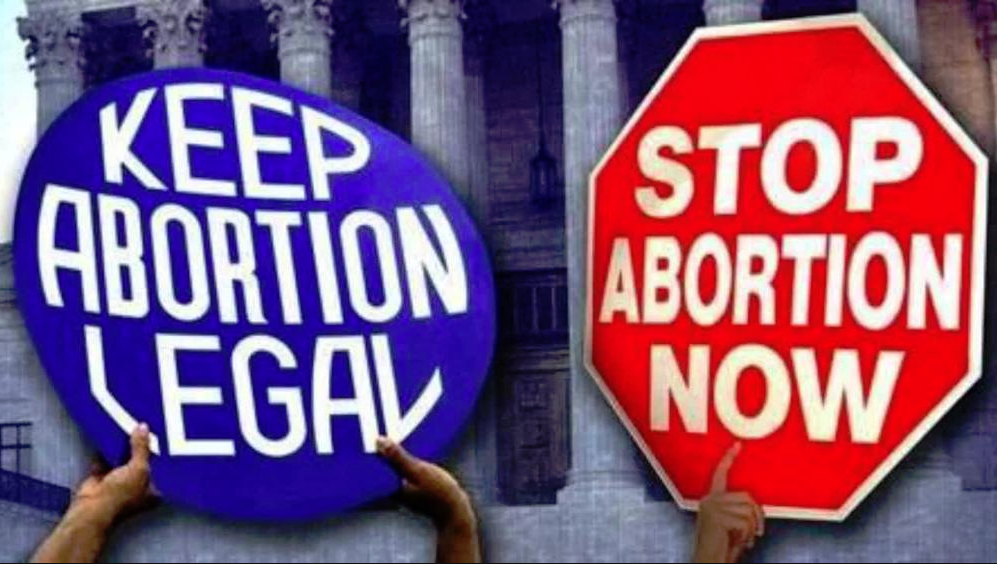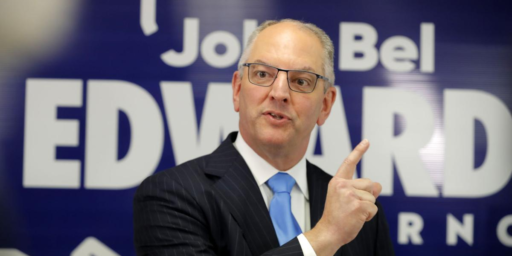Louisana’s Democratic Governor to Sign Abortion Ban
Jon Bel Edwards is a reminder that our divide is cultural, not just partisan.

The trend towards passing draconian anti-abortion laws in defiance of nearly half a century of Supreme Court precedent continues. This time, there’s a twist.
Nearly three decades ago, when Democratic Louisiana Gov. John Bel Edwards’ wife was 20 weeks pregnant with their first child, a doctor discovered their daughter had spina bifida and encouraged an abortion. The Edwardses refused.
Now, daughter Samantha is married and working as a school counselor, and Edwards finds himself an outlier in polarized abortion politics.
“My position hasn’t changed. In eight years in the Legislature, I was a pro-life legislator,” he said. When he ran for governor, his view was the same. “I’m as consistent as I can be on that point.”
Edwards, who has repeatedly bucked national party leaders on abortion rights, is about to do it again. He’s ready to sign legislation that would ban the procedure as early as six weeks of pregnancy, before many women know they are pregnant, when the bill reaches his desk.
Louisiana’s proposal , awaiting one final vote in the state House, would prohibit abortion after a fetal heartbeat is detected, similar to laws passed in Kentucky, Mississippi, Georgia and Ohio that aim to challenge the U.S. Supreme Court’s 1973 Roe v. Wade decision that legalized abortion. Alabama has gone even further, enacting a law that makes performing abortions a felony at any stage of pregnancy with almost no exceptions.But the abortion bans in those other conservative states — spurred by anti-abortion activists hoping the addition of conservative judges to the Supreme Court could help overturn Roe v. Wade — were backed by Republican governors.
A rarity in his party, Edwards’ anti-abortion stance provokes angry outcries on social media from Democratic voters and disappointment within the party’s broader ranks across the country.
“When Republicans are taking away women’s rights at every step, it’s on the Democrats to show that we are the party that will protect women. When we fail to do that, we make it absolutely hopeless for women around the country,” said Rebecca Katz, a progressive Democratic consultant.
The abortion-rights debates that divide state Capitols across the nation cause few ripples in the Louisiana Legislature. It is one of the country’s most staunchly anti-abortion states, with a law on the books that immediately outlaws abortion if Roe v. Wade is ever overturned. State lawmakers annually enact new regulations seeking to curb access with bipartisan support.
This year’s so-called heartbeat bill, sponsored by Democratic state Sen. John Milkovich, has received little public opposition from lawmakers as it steadily advances. The ban, however, only would take effect if a federal appeals court upholds a similar law in Mississippi.The Louisiana bill includes an exception if the pregnant woman’s health is in “serious risk,” but not for pregnancies caused by rape or incest.
“It gives a very small window for a woman to be able to access abortion services,” said Elizabeth Nash of the Guttmacher Institute, an abortion rights organization that researches reproductive health issues.
Edwards’ embrace of the anti-abortion legislation is unusual for a present-day Democratic governor, Nash said, although that was not always the case.“If you think back 20 years, abortion politics were less along party lines,” she said. “There were moderate Republicans who supported abortion rights because they felt there was a right to privacy and places where government should not go.”
Edwards said his views are in line with the people of his conservative, religious state, who he described as “overwhelmingly pro-life.” And he said he extends that philosophy to his decision to expand Louisiana’s Medicaid program under the federal health overhaul law, a decision unpopular with Republicans, “because I think that, too, is pro-life.”
“That’s the way I was raised. That’s what my Catholic Christian faith requires,” the governor said on his monthly radio show. “I know that for many in the national party, on the national scene, that’s not a good fit. But I will tell you, here in Louisiana, I speak and meet with Democrats who are pro-life every single day.”When he ran for governor in 2015, Edwards made opposition to abortion a central platform of his campaign. In a TV ad, his wife, Donna, described being advised to have an abortion because of their daughter’s spinal birth defect. The ad showed a grown-up Samantha as Donna Edwards said, “She’s living proof that John Bel Edwards lives his values every day.”
—AP, “Louisiana governor breaks with Democratic Party on abortion“
The fact that the Edwards family was able to live their values for the past three decades would seem to indicate that it was possible to do so under existing law. This is about imposing those values on the entire state—4.66 million people—some of whom might believe differently.
The rush to sign these laws, presumably a function of Brett Kavanaugh having replaced the more moderate Anthony Kennedy (and running out the clock on Merrick Garland to allow President Trump to appoint Neil Gorsuch), is startling. It’s a further demonstration of just how polarized the country is right now on core values.
Edwards is a reminder that, while this divide mostly aligns with the two political parties, it goes beyond that. It’s about culture, first and foremost, and party imperfectly mirrors it.




It’s also worth keeping in mind that Edwards did not exactly campaign as a liberal when he won, although I think he probably would not have won had Republicans put up someone other than the scandal-tainted David Vitter.
@Doug Mataconis: Yes, fair point.
“cultural, not just partisan”
So, between those who think that aborting the unborn is super awesome and those who think it is horrible.
I think this demonstrates the confidence in certain corners that the law is nothing more than what a court majority says it is at any given moment. And this is the Republican moment.
It should be remembered that the late Democratic Senator Bob Casey Sr. lent his name to the most significant judicial challenge to Roe to date, Casey v. Planned Parenthood. But that’s ancient history now. Today, for the most part, “pro-life Dems” aren’t a thing anymore. The few that are left (including Sen. Casey Jr.) are in practice usually a lot more moderate on the issue than their Republican counterparts. That’s why Edwards’ actions surprised so many pundits, even though it’s what he campaigned on. It wouldn’t have raised as many eyebrows just a couple of decades ago.
I don’t know that one, or a few, outliers demonstrate that the partisan divide and the cultural divide aren’t thoroughly entwined. In fact, I recently read a whole book on how deeply entwined they are, Prius or Pickup. Their point isn’t that there aren’t pre-existing cultural, and psychological, differences, but that one party has become very good at, and totally dependent on, exploiting those differences.
To uinderstand modern GOP politics you have to understand the concept of a positive feedback loop. Your home thermostat provides a negative feedback loop. If temperature drops below a set point, the thermostat turns on the heat. If temp goes above the set point, the thermostat turns on cooling. This is a negative feedback system. It’s a stable system that will remain close to the set point. If it worked the other way, too hot turned up the heat, it would be a positive feedback system.
The RW media push their audience further right, the audience votes for the most RW candidate, the candidates make more over the top promises, which drives the voters further right, which drives the media further right…
A positive feedback system is unstable. In my thermostat example the heat would run full time, driving the temperature as hot as it could. A positive feedback system pushes the system to its limits until something breaks. I fear the country will break before the Republican Party breaks.
Who thinks abortion is “super awesome”? As Leslie Jones so eloquently put it, maybe all these pasty-faced middle-aged heterosexual white cisgendered males think it is super awesome to control the bodies of women…or maybe you think it’s super awesome for rape victims to have to give birth to the children of their rapists…
Indeed…Thurgood Marshall framed his judicial philosophy as, “You do what you think is right and let the law catch up.” He’s not the only Supreme Court Justice with that judicial philosophy…
Also a good analogy for climate change…the planet will break before we do anything substantial to solve the problem…
I’m a little surprised we have any pro-life Democratic governors, but not shocked. There are spots where “as progressive as can be elected” isn’t that progressive.
@gVOR08:
I’m not claiming otherwise. Indeed, I close with, “It’s about culture, first and foremost, and party imperfectly mirrors it.”